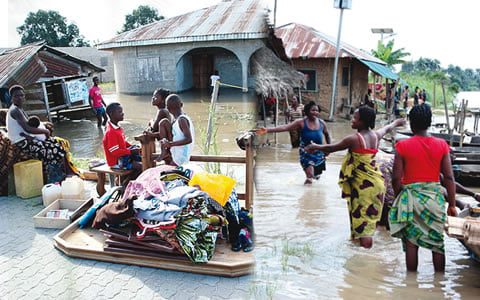Trending
Niger Flood Crisis Hits Hard: Kano on High Alert as Rainy Season Begins
As the rainy season begins across Nigeria, many states are already facing deadly floods, with Niger State hit especially hard.

The Niger flood crisis has claimed over 150 lives in Mokwa, with many more still missing as rescue efforts continue. Experts warn that more states could be affected in the coming weeks, urging urgent action from both federal and state authorities.
Earlier this year, the Nigerian Meteorological Agency (NiMET) had warned that at least 13 northern states would likely experience heavy flooding in 2025. In their forecast, NiMET stated:
“A normal to below-normal annual rainfall is anticipated in most parts of Nigeria compared to long-term average. High-intensity rainfall is expected in May to June that may likely result in flash floods in the coastal cities.”
The Federal Government also raised alarm through the Minister of Water Resources, Prof. Joseph Utsev, who disclosed that 1,249 communities across 176 local government areas in 30 states, including the Federal Capital Territory (FCT), are at risk of severe flooding.
Already, flooding has been reported in parts of Kano, Borno, and Maiduguri. In 2024, Jigawa faced one of the worst flood disasters as rains destroyed homes and farmlands, leaving hundreds displaced.
In the current year, states at high risk of floods include:
Abia, Adamawa, Akwa Ibom, Anambra, Bauchi, Bayelsa, Benue, Borno, Cross River, Delta, Ebonyi, Edo, Gombe, Imo, Jigawa, Kebbi, Kogi, Kwara, Lagos, Nasarawa, Niger, Ogun, Ondo, Osun, Oyo, Rivers, Sokoto, Taraba, Yobe, Zamfara, and the FCT.
The Nigeria Hydrological Services Agency (NIHSA) has further confirmed that water levels in major dams like Shiroro and Kainji, both located in Niger State, are dangerously high and could overflow if rains persist. In the past, these dams have contributed to floods in nearby communities.
Despite warnings from both NiMET and NIHSA, the response from authorities appears to be slow and limited. This has raised concerns among environmental experts and citizens, especially after the tragic loss of lives in Mokwa.
According to DAILY POST, Umar Sale Anka, a council member of the Institute of Environmental Practitioners of Nigeria (IEPN), said the recent Niger flood crisis exposed the weaknesses in Nigeria’s emergency response system.
He explained,
“Despite early warnings, the response was slowed by lack of institutional memory, insufficient resources, poor funding, and manpower shortages, especially at the state level.”
He also highlighted how environmental degradation has made the situation worse. Forests that once served as natural barriers to flooding have been destroyed by years of deforestation.
“These natural barriers helped absorb rainwater and reduced flood risk. Without them, water flows freely into communities, causing massive destruction.”
Anka further noted that insecurity in some areas has prevented aid workers from reaching affected communities. Even when help is available, access is often blocked due to safety risks.
He added that cultural beliefs also play a role in the flood crisis:
“People are emotionally tied to their ancestral homes. Even when warned, many refuse to leave because of strong cultural ties to their land, the graves of their forefathers, and sacred places.”
He described these emotional connections as deeply human, but also a challenge to disaster planners who must balance logistics with cultural sensitivity.
In Kano State, emergency officials have started taking steps to prevent a repeat of the Niger tragedy. The Kano State Emergency Management Agency (SEMA) confirmed that floods have already hit parts of Madobi, Shanono, and Tudun Wada.
SEMA’s Executive Secretary, Isyaku Kubarachi, said that the agency is working closely with the National Emergency Management Agency (NEMA) and other partners.
“We would hold stakeholders meeting to address the issue,” he said, though he did not provide full details.
READ ALSO: Sanwo-Olu Mourns Olu of Epe, Oba Shefiu Adewale
He added that the media would also be included in the discussions to ensure public awareness and help reduce future risks.
The Niger flood crisis is a stark reminder of how unprepared many parts of the country are for natural disasters. With more rains expected in the coming months, experts say proactive steps must be taken now to avoid further loss of lives and property.
This includes clearing blocked drainages, relocating people from flood-prone areas, improving early warning systems, and funding state emergency agencies properly. Public awareness and environmental education are also key in helping communities prepare for floods before they strike.
As Nigeria continues to face unpredictable weather patterns due to climate change, the need for long-term planning and investment in disaster management has never been more urgent.
JOIN THE CONVERSATION→ Telegram | X/Twitter | Facebook | WhatsApp|WhatsApp Channel|Mobile App|Instagram















